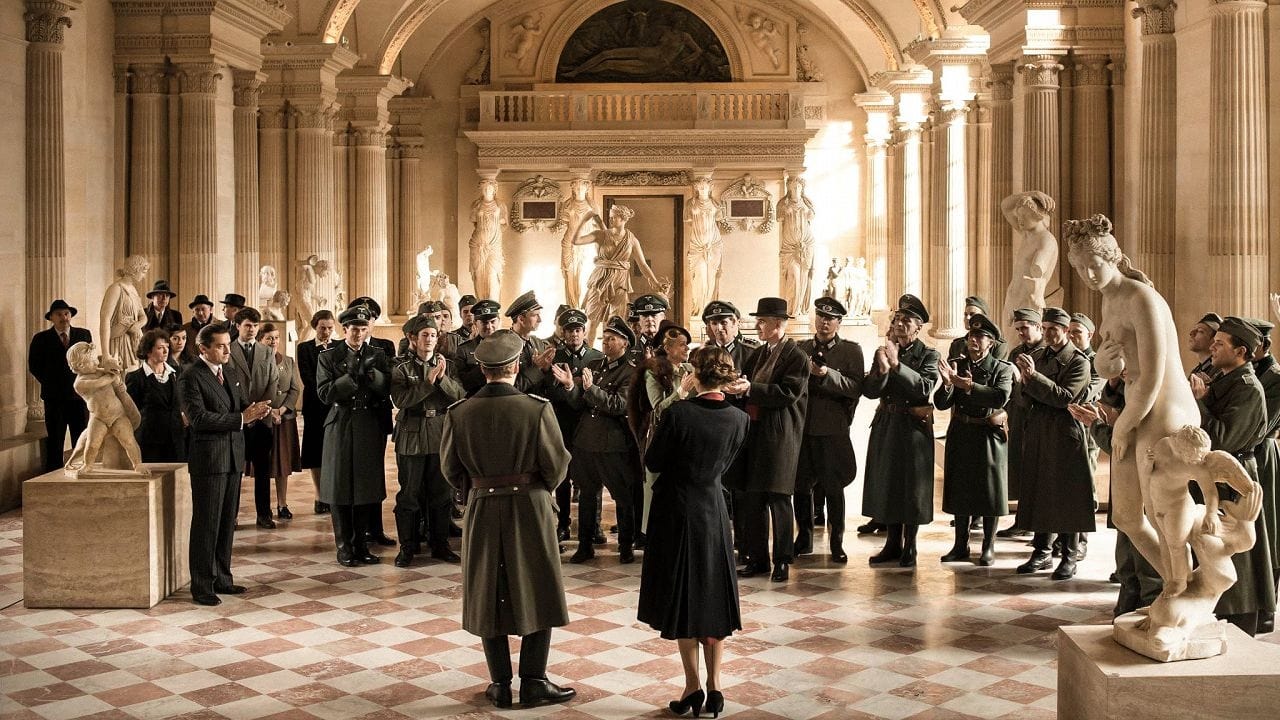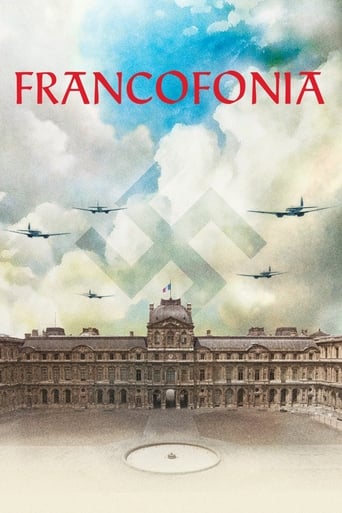

Powerful
... View MoreFor having a relatively low budget, the film's style and overall art direction are immensely impressive.
... View MoreExcellent and certainly provocative... If nothing else, the film is a real conversation starter.
... View MoreStrong acting helps the film overcome an uncertain premise and create characters that hold our attention absolutely.
... View MoreRevered Russian director Aleksandr Sokurov's paean to the Louvre Museum and mankind's art treasure is an inventive genre-buster but also a bemusing underachiever. Reconstructing the scenarios of Louvre under Nazi occupation during WWII, Sokurov blots out the distinctions between documentary and fiction filmmaking: archival documents and vintage photos, recurring shots of an anonymous apartment at present where video footage of a struggling cargo ship amid the choppy ocean is playing on the computer, interlaced into a lax narrative re-enacting the story between Jacques Jaujard (de Lencquesaing), the director of the French National Museums and a Nazi officer, Count Franz Wolff-Metternich (Utzerath), predominantly, their so-called Kunstschutz (art protection) movement during WWII, which has spawned a feeble Hollywood dramatization, George Clooney's star-studded THE MONUMENTS MEN (2014). Yet, the film's overall effort fails to pass muster as a competent infotainment which dissects the cardinal situation where arts and warfare corralled together, Sokurov's platitudinous commentaries breathe with a wisp of solipsistic sentiment, although perambulating inside the Louvre is inherently enchanting, and Sokurov's slick camera-work guides viewer to the ensconced masterpieces with his trademark aplomb and dexterity, not to mention the awesome temporal morphing panorama feat. Personally, the segment where the camera slithers around a mummy exhibit is quaintly numinous. But our tour is often interrupted by a resurrected Napoléon Bonaparte (Nemeth), repugnant and irksome in his boosted egoism, and Marianne (Korthals Altes) repetitively uttering the incantation of "liberty, equality and fraternity", when you have the entire Louvre at your feet, but we are only allowed to glance at such a limited purview, rank dissatisfaction inevitably materializes. Stripped off the "single take" stunt with which he has stunned the world in Russian ARK (2002), this belated pendant work haplessly betrays that Sokurov's ambition and talent has ebbed away significantly, especially when his disaffected grouse can be overtly detected through counterpointing the disparate circumstances between France and his fatherland, a close-minded overtone of editorializing writ large woefully.
... View MoreSometimes what we've seen before is enough. Director/ Writer Aleksandr Sokurov, who did so well with 'The Russian Ark,' a seamless, one-long- take tour of the Hermitage, does fails heavily with the Louvre. The computerized opening is mere gadgetry; a sour Napoleon brags about the art he stole for the Louvre; Marianne, the personification of France, appears serially, glumly droning Liberté, Égalité, Fraternité rather too often. Earlier Mariannes (e.g. Bardot, Deneuve, Casta) were at least lookers. Too much time is spent on stuff long-since covered by 'Monuments Men' and at least one TV documentary on the Nazi occupation and art looting. As nothing new is added, 'bored stiff' will have a literal meaning unless your theater has really good seats.
... View More"Francofonia" (2015 release from France; 90 min.) is a non-fiction movie loosely about the Louvre museum in Paris. As the movie opens, we hear a certain Alexander (that would be the movie's Russian director Alexander Sokurov) in conversation with a certain Dirk, who is on an ocean liner with art in one of its containers. It's not long before Sokurov directs his attention to June 14, 1940, when German troops overtook Paris, including archive footage of Hitler inspecting the Eiffel Tower and muttering "Where is the Louvre?" Eventually, we are introduced to Jacques Jaujard, the Louvre's museum director at that time, and Count Metternich, entrusted by Hitler to supervise the Louvre's art collection for the Nazis. At this point we're not quite 15 min. into the movie, but to tell you more would spoil your viewing experience. You'll just have to see for yourself how it all plays out.Couple of comments: this is the latest oeuvre from writer-director Aleander Sokurov, best know for "Russian Ark" (about the Hermitage in St. Petersburg). In fact it can be said that "Francofonia" is a spiritual sequel to that movie. Going in, I knew that "Francofonia" was about the Louvre, but didn't know more than that. And while it is true that the movie's primary subject matter is the Louvre, it is in equal measure about the WWII occupation of Paris by the Germans, and a bunch of other things as well ("why are portraits so important in European culture, whereas they are non-existent in the Muslim culture?", asks Sokurov). Even while it's not always clear what the ultimate aim or direction of the movie is, that's not a problem for me. The only jarring thing for me was the occasional and unnecessary appearance of actors impersonating Napoleon (whom we see staring at the Mona Lisa, while repeating "C'est moi!") and France. And oh yea, we do get to see a bunch of paintings and other works of art from the Louvre. In the end, I was surprised how quickly the 90 min. had flown by, so while this movie is rather strange, it certainly is intriguing and held my attention.This movie made quite a splash at the 2015 Venice Film Festival. "Francofonia" opened without any pre-release fanfare or advertising at my local art-house theater here in Cincinnati a week ago, and the Thursday early evening screening where I saw this at was one of its last, as the movie was gone the next day. I was frankly surprised how many people there were (about 10), but maybe they had the same thought as I did (better see this before it's gone!). If you are in the mood for a deeply subjective non-fiction film (but don't call it a documentary) about the Louvre, I'd readily suggest you check this out.
... View MoreHaving seen and loved Sokurov's earlier film "Russian Ark", I found "Francofonia" a disappointment.While "Russian Ark" also switches its scenes from one historical period to another, in that film it all came together into a coherent whole through its setting inside the Hermitage, as well as by its groundbreaking single take. "Russian Ark" was an astonishing cinematic tour de force. In comparison, "Francofonia" is just an incoherent jumble of unrelated thoughts.The theme that gets the most attention in "Francofonia" is the period of the German occupation of Paris in WW2, when the Louvre's collection was evacuated and stored in various chateaux and other locations throughout France as a precaution against the chance that Paris would be bombed later in the war. Interspersed with this is a series of vignettes on mostly unrelated subjects. We see the emperor Napoleon telling the viewer how the best of the Louvre's art collection was brought to France by him as spoils of war; footage of Hitler being escorted around Paris to admire the Eiffel Tower, the Champs Elysées and other monuments; scenes from the siege of Leningrad; a bit on the policies of Marechal Pétain, leader of the collaborationist Vichy government; a history of the Louvre building since its beginnings as a fortress in the middle ages; and a lament about the risks of transporting art treasures in ships over the high seas. Throughout the film we hear the voice of the narrator, speaking in Russian.It all comes across as a dose of revisionist history, where the underlying message seems to be: "The French were smart and did themselves a great favor by going along with the German occupation during the war, as witnessed by the fact that the Germans kept their hands off the Louvre's collection so that it survived the war intact. The Nazis were very cruel to us Russians, but on the whole they were not so bad." I didn't buy it.
... View More